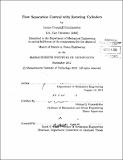Flow separation control with rotating cylinders
Author(s)
Schulmeister, James Crandall
DownloadFull printable version (7.174Mb)
Other Contributors
Massachusetts Institute of Technology. Dept. of Mechanical Engineering.
Advisor
Michael S Triantafyllou.
Terms of use
Metadata
Show full item recordAbstract
The hydrodynamic forces on ocean vehicles increase dramatically during sharp maneuvers as compared to forward motion due to large areas of separated flow. These large forces severely limit maneuverability and reduce efficiency. Applying active flow separation control to ocean vehicles would reduce resistance during maneuvers and thereby improve maneuvering performance. In this thesis I discuss experiments in active separation control in a simpler, but still relevant, two-dimensional flow past a circular cylinder at moderate sub-critical Reynolds numbers (37,000 and 52,000 in experiment and 100 and 10,000 in simulation). The active control injects momentum into the boundary layer via the moving surfaces of two small control cylinders located near boundary layer separation and rotated by servo motors. The relationship between drag and rotation rate is found to be Reynolds number regime dependent; at Re = 100 the drag decreases linearly with rotation rate and at Re = 10,000, the relationship is non-linear. This nonlinearity appears to be due to the interaction between vortex shedding from the small control cylinders (which does not occur at Re = 100) and the main cylinder wake. Computational two-dimensional viscous simulations are consistent with the physical experiment and help to illustrate the phenomenon. Finally, the power consumed by the active control mechanism is considered and estimated to be significantly smaller than the power savings in reduced drag.
Description
Thesis (S.M. in Ocean Engineering)--Massachusetts Institute of Technology, Dept. of Mechanical Engineering, 2012. Cataloged from PDF version of thesis. Includes bibliographical references (p. 61-62).
Date issued
2012Department
Massachusetts Institute of Technology. Department of Mechanical EngineeringPublisher
Massachusetts Institute of Technology
Keywords
Mechanical Engineering.